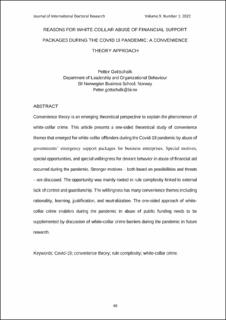| dc.contributor.author | Gottschalk, Petter | |
| dc.date.accessioned | 2023-10-13T12:59:35Z | |
| dc.date.available | 2023-10-13T12:59:35Z | |
| dc.date.created | 2022-12-20T16:27:54Z | |
| dc.date.issued | 2022 | |
| dc.identifier.citation | Journal of International Doctoral Research. 2022, . | en_US |
| dc.identifier.issn | 2328-0832 | |
| dc.identifier.uri | https://hdl.handle.net/11250/3096465 | |
| dc.description.abstract | Convenience theory is an emerging theoretical perspective to explain the phenomenon of white-collar crime. This article presents a one-sided theoretical study of convenience themes that emerged for white-collar offenders during the Covid-19 pandemic by abuse of governments’ emergency support packages for business enterprises. Special motives, special opportunities, and special willingness for deviant behavior in abuse of financial aid occurred during the pandemic. Stronger motives – both based on possibilities and threats – are discussed. The opportunity was mainly rooted in rule complexity linked to external lack of control and guardianship. The willingness has many convenience themes including rationality, learning, justification, and neutralization. The one-sided approach of whitecollar crime enablers during the pandemic in abuse of public funding needs to be supplemented by discussion of white-collar crime barriers during the pandemic in future research. | en_US |
| dc.language.iso | eng | en_US |
| dc.title | Reasons for white-collar abuse of financial support packages during the Covid-19 pandemic: A convenience theory approach | en_US |
| dc.title.alternative | Reasons for white-collar abuse of financial support packages during the Covid-19 pandemic: A convenience theory approach | en_US |
| dc.type | Journal article | en_US |
| dc.type | Peer reviewed | en_US |
| dc.description.version | publishedVersion | en_US |
| dc.source.pagenumber | 40-60 | en_US |
| dc.source.volume | 9 | en_US |
| dc.source.journal | Journal of International Doctoral Research | en_US |
| dc.source.issue | 1 | en_US |
| dc.identifier.cristin | 2095929 | |
| cristin.ispublished | true | |
| cristin.fulltext | postprint | |
| cristin.qualitycode | 1 | |
